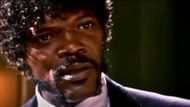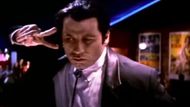Quentin Tarantino's Pulp Fiction is a cult favorite film. Fans cherish it for its non-linear narration, blunt dialogues, and, of course, iconic characters. But underlying all the bloodshed and humorous banter, the movie poses a deep question: Do people have the ability to change, or are they doomed to remain in the same ways forever?
Tarantino basically discusses choices, change, and destiny through the central characters—Jules, Vincent, Butch, and so on. However, Pulp Fiction does not have a typical beginning-to-end narrative. Rather, the film cuts back and forth through time.
This is not just a unique style adopted for Pulp Fiction. The circular structure is also indicative of how many of the characters are constantly repeating themselves.
Each segment of the film places a character at a crossroads. They have to make a decision. But do they actually change afterwards?
What is Pulp Fiction about?
Pulp Fiction is a 1994 crime film set in Los Angeles. The movie follows a number of characters whose lives intersect at some point in the film, although they don't appear to at first.
It's filled with crime, dark humor, and scenes where individuals attempt to change.
One of the central narratives of Pulp Fiction is that of two hitmen, Jules Winnfield and Vincent Vega. They are employed by a gangster named Marsellus Wallace.
Early on, they are sent to retrieve a mysterious briefcase that Marsellus owns. This gets them into odd and perilous situations. They narrowly escape being killed in a shooting, and they also find themselves in a diner that is being robbed.
These experiences cause Jules to begin questioning his life.
Another storyline in Pulp Fiction depicts Vincent Vega having a night out with the boss's wife, Mia Wallace. They initially go out for dinner and dancing. However, things go awry when Mia accidentally takes drugs and almost dies. Vincent must act quickly to rescue her.
There is also the story of Butch Coolidge, a boxer. Marsellus pays him to lose a fight, but Butch wins the match instead. This makes Marsellus really furious. Butch flees, but he has to return to retrieve his father's watch, which is important to him.
In the process, he encounters Marsellus once more. They have to fight a dreadful rival in concert, and that makes them collaborate for a brief time.
Meanwhile, we encounter a couple, Pumpkin and Honey Bunny. They plan to rob a diner. But in the process of robbing the diner, they encounter Jules, who is sitting there contemplating changing his life.
This encounter is a turning point for all the people in the room.
The manner in which the film presents these stories is not chronological. Things occur at varying times, and characters reappear later in various scenes.
This unusual structure is what makes Pulp Fiction intriguing, and it illustrates how all the characters are linked in some way.
Jules Winnfield: The man who tries to change

Jules is a professional killer. Early in the film, he comes across as confident. He even cites the Bible as he goes about killing individuals.
However, one day, he and Vincent survive a shooting that would have killed them. Jules believes that this was divine intervention. This incident, however, disturbs him.
He begins questioning his existence and the type of person he is.
In the last scene, Jules speaks of a Bible verse he would recite before killing people. He confesses that he never knew what it meant until today.
He comes to understand that he has been the evil man, not the righteous one.
What is significant is that Jules doesn't merely speak of change—he does it. In the diner scene, he opts for peace over violence. He lets the robbers go and decides to leave the crime world. He says he wants to “walk the earth” and find a new purpose.
In Tarantino’s world, where many people stay the same, Jules is one of the few who tries to change. His story shows that real change is hard, but possible—if you’re honest with yourself and brave enough to act differently.
Vincent Vega: The man who doesn't change

Vincent is Jules's business partner. He is cool and laid-back, but he doesn't think much like Jules. When Jules says their survival is a miracle, Vincent attributes it to luck.
He doesn't stop and question his existence. He just continues to use drugs, does his work, and lives the same.
Because Vincent refuses to change, he gets killed.
He is murdered in Butch's apartment because he did not leave his life of crime like Jules. Tarantino appears to be saying that if you remain the same and do not accept opportunities to change, you could end up losing out.
Butch Coolidge: Somewhere in the middle

Butch is a boxer. He is to lose a fight intentionally, but double-crosses the crime lord, Marsellus Wallace, and wins the fight. It lands him into trouble, and Butch needs to flee.
At one time, Butch flees but returns to rescue Marsellus from being attacked. This is a pivotal moment. It indicates that Butch knows right from wrong. He puts his life in danger to do the right thing.
Then he flees with his girlfriend. We don't know what happens to him afterwards, but he appears to be going towards a better life.
Butch does not get the grand moral monologue of Jules, yet his actions indicate that he can change. It is a tale of survival, courage, and perhaps learning to care for others.
Other characters: No change

The majority of the other characters in Pulp Fiction do not change.
Mia Wallace, Marsellus's wife, overdoses but returns to normal life. She does not grow or change. Marsellus Wallace is never in control of anything, yet he never questions anything he does.
Pumpkin and Honey Bunny, the robbers at the diner, are let off by Jules, but we can't say if they ever change. They only appear to be scared rather than sorry.
Tarantino shows us that the majority of people just continue doing what they've always done. They're locked in a cycle of violence, crime, and revenge.
Morality in Pulp Fiction
The film toys with right and wrong. Everyone in Pulp Fiction has their own code. What's "right" for one guy might be "wrong" to another.
Like, when Marvin gets shot by mistake, Vincent and Jules aren't troubled. They only worry about having to clean the mess. They rationalize what they've done. That makes it difficult for them to really change, because they don't believe that they need to.
Tarantino never says that human beings must be saints. He never guarantees happy endings. But he appears to care about the effort. He illustrates that striving to improve is what determines a person.
Jules attempts to be a better man. He breaks away from criminality. Vincent does not attempt and ends up dead. Butch risks doing the right thing, though we do not know how his tale ends.
We don't have to know the end result to know the message: It's the decision to change that counts.
So, can people really change?
Pulp Fiction questions whether people can really change. The response is not easy. The majority of characters remain the same. They keep doing the same things and never question themselves. How the film cuts back and forth in time assists in displaying this concept—they're trapped in loops.
But then characters like Jules demonstrate that change can happen. It requires awareness, bravery, and action. Even if you don't have a clue where the road goes, taking the initiative to travel a different road matters.
The movie reminds us that attempting to change, just trying, is a mighty thing.
And perhaps that is the true purpose of Pulp Fiction.
Love movies? Try our Box Office Game and Movie Grid Game to test your film knowledge and have some fun!
